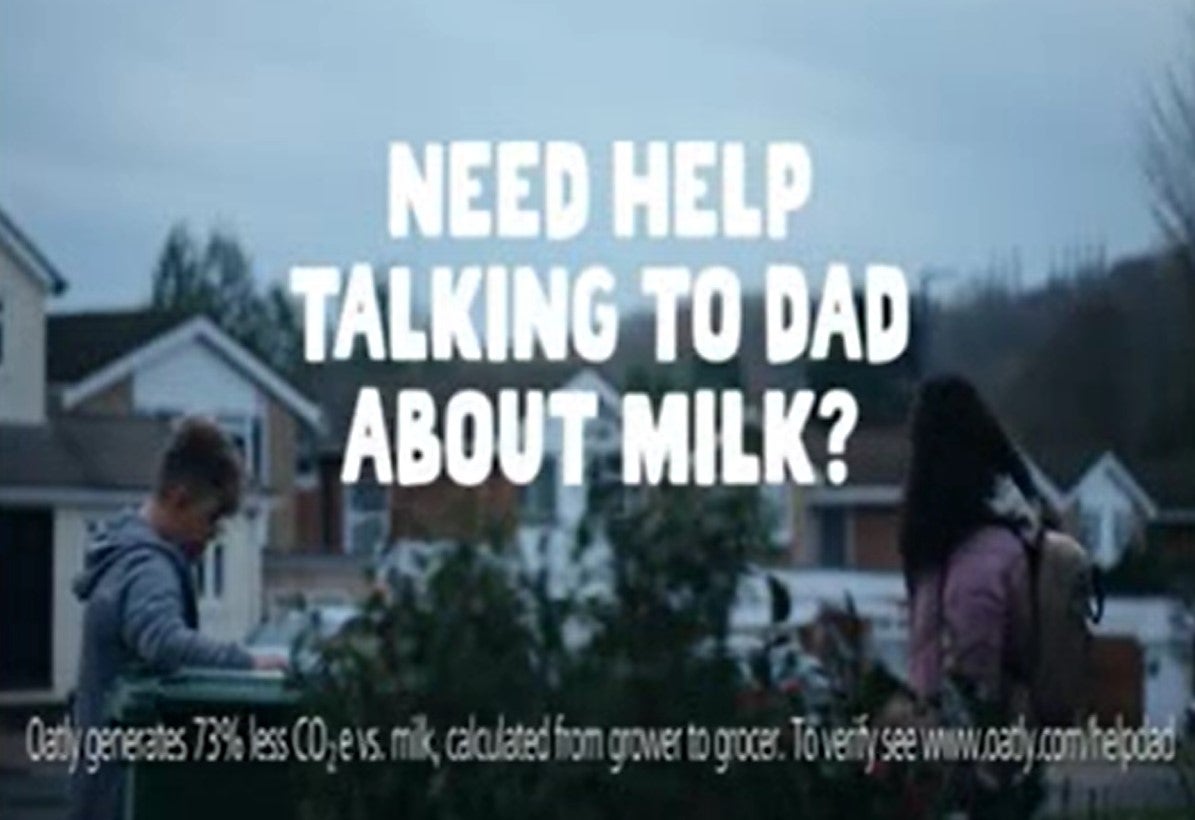Oatly ads banned over misleading environmental claims
The Advertising Standards Authority received 109 complaints, including from the campaign group A Greener World, that the claims were misleading.

Your support helps us to tell the story
From reproductive rights to climate change to Big Tech, The Independent is on the ground when the story is developing. Whether it's investigating the financials of Elon Musk's pro-Trump PAC or producing our latest documentary, 'The A Word', which shines a light on the American women fighting for reproductive rights, we know how important it is to parse out the facts from the messaging.
At such a critical moment in US history, we need reporters on the ground. Your donation allows us to keep sending journalists to speak to both sides of the story.
The Independent is trusted by Americans across the entire political spectrum. And unlike many other quality news outlets, we choose not to lock Americans out of our reporting and analysis with paywalls. We believe quality journalism should be available to everyone, paid for by those who can afford it.
Your support makes all the difference.Adverts for oat drink company Oatly have been banned for making misleading environmental claims.
The two TV ads, a paid-for Facebook post, a paid-for Twitter post and two newspaper ads made various claims about Oatly’s environmental credentials, such as “Oatly generates 73% less CO2e (carbon dioxide equivalent) vs milk, calculated from grower to grocer”, “The dairy and meat industries emit more CO2e than all the world’s planes, trains, cars, boats etc combined”, and “Today, more than 25% of the world’s greenhouse gases are generated by the food industry, and meat and dairy account for more than half of that.”
One of the national press ads featured the claim: “Climate experts say cutting dairy and meat products from our diets is the single biggest lifestyle change we can make to reduce our environmental impact”, and “If everyone in the world adopted a vegan diet, it would reduce food’s annual greenhouse emissions by 6.6bn metric tons (a 49% reduction).”
The Advertising Standards Authority (ASA) received 109 complaints, including from the campaign group A Greener World, that the claims were misleading.
Oatly UK said independent product lifecycle assessment experts CarbonCloud calculated the climate footprint “from cradle to store” of Oatly Barista Edition oat drink to be 0.44 kg CO2e/kg, including the emissions from agricultural production of oats and rapeseed, processing of ingredients, transport of ingredients, energy consumption in the Oatly factory, packaging and distribution.
They calculated the climate footprint of whole cow’s milk to be 1.6 kg CO2e/kg and included the emissions from agriculture, transport of ingredients, energy consumption of the dairy factory, packaging and distribution.
However the ASA said consumers would understand the “73% less CO2e vs milk” claim to mean that all Oatly products generated 73% less CO2e compared with any type of cows’ milk and therefore expected to see the related evidence.
We told Oatly UK to ensure that the basis of any environmental claim was made clear, including what parts of the lifecycle had been included and which excluded
It concluded that, because the evidence was not sufficient to support the claim as consumers would understand it, the two ads that included the claim were misleading.
It also found the claim that the dairy and meat industries emit more CO2e “than all the world’s planes, trains, cars, boats etc combined” did not take into account equivalent parts of both industries’ lifecycles and therefore overstated emissions from the meat and dairy industries.
The ASA found the claim that meat and dairy accounts for more than half of the 25% of the greenhouse gases generated by the food industry was too narrow a definition and could mislead customers.
Finally, the ASA said consumers would understand the claim that “climate experts say cutting dairy and meat products from our diets is the single biggest lifestyle change we can make to reduce our environmental impact” as a “definitive, objective claim that was based on scientific consensus” when it was the opinion of one climate expert.
It’s clear that we could have been more specific in the way we described some of the scientific data. We’re a science-based company and take pride in being precise, but we could have been clearer
The ASA ruled that the ads must not appear again.
It said: “We told Oatly UK to ensure that the basis of any environmental claim was made clear, including what parts of the lifecycle had been included and which excluded.
“We also told them to ensure they held adequate evidence to substantiate environmental claims made in their ads as they would be understood by consumers.”
Oatly spokesman Tim Knight said: “It’s clear that we could have been more specific in the way we described some of the scientific data.
“We’re a science-based company and take pride in being precise, but we could have been clearer. We talk about these things a lot, because we want to make it easy for people to make an informed switch from dairy to oat drink.”